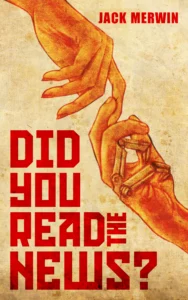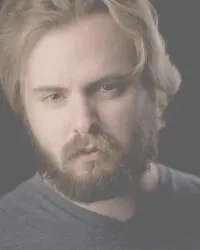Did You Read The News? by Jacob Merwin

On the faraway planetary colony of Nemiza, they even make the playgrounds out of concrete.
Mismanaged cities crumble away into dust while fantastical starships from worlds unseen simultaneously dock in their ports. None of this seems odd to Antuny, the privileged son of a local politician, who strives every day to embody his hero; Dear Leader Itto, the elderly Dictator of Nemiza. Antuny grows up idolizing Itto and spends his waking hours committing the tyrant’s many speeches to memory. Only his best friend Krasna can keep him level-headed and calm.
As the two grow up, fall in love, and start a life together, their impoverished world begins its downward spiral into sectarian violence and civil war. Everything Antuny believes in collapses before his eyes as the starships stop coming. Trapped behind the walls of a dilapidated, dystopian city, their innocence lost forever, the two struggle to hold on to their humanity in the face of total devastation.
Did You Read The News? Review
I was compensated with a small amount for my time and effort in reading the book and writing this review. However, all thoughts and opinions expressed are my own and are based on my honest personal experience reading the book. Nor did the publisher in any way shape or form ever pressure me to give a positive review.
Jack Merwin’s dystopian novel Did You Read The News? takes us to the far-off planetary colony of Nemiza. Here, Antuny, the well-off son of a local politician, aspires to be just like the aging Dictator of Nemiza, Dear Leader Itto, with great affection. A decaying, poorly run city and mythical starships that once sailed their ports but have since vanished provide the setting for the story.
Antuny’s life is defined by his steadfast devotion to Itto and his daily recital of the dictator’s remarks. As he and his closest friend Krasna work through the difficulties of growing up, falling in love, and beginning a family, the once-prosperous society spirals into civil war and sectarian slaughter. The story delves into the devastating effects of this unrest on Antuny and Krasna, as they struggle to maintain their humanity in the crumbling walls of their dystopian city and face the loss of innocence. Amid enormous problems, the book provides a provocative reflection on power, leadership, and the fallout from societal degradation.
Did You Read The News? feels more mature, where the dystopian plot seems to be the primary focus, and the romantic elements or relationships take a more subdued role. It’s worth noting, for reference, that I am an avid reader of romance, and in this book, the romantic aspects don’t command as much attention as I typically encounter in my reading preferences.
In case the design of the cover is not obvious enough, this book delves into the theme of the indoctrination of Marxist and authoritarian ideals. I consider the depiction of indoctrination to be mostly well done for a fictional setup. Beyond exploring the protagonist’s character development, the story captures the sense of hopelessness that permeates their situation and adds a genuine element to the worldbuilding. This dynamic is reminiscent of works such as “Dunkirk” or “Hakuoki,” where the protagonist’s personality and authenticity are preserved by purposefully eschewing an overbearing “main protagonist halo” in favor of a larger stage and location.
The initial pace of the book was rather slow, making it a bit challenging for me to stay engaged as I found it difficult to follow. However, given the intricate groundwork, the book was laying out—establishing contexts, relationships, and backgrounds (a testament to its ambitious narrative)—I made a conscious effort to be more lenient in my judgment. Fortunately, the pace did pick up as the story progressed, ultimately improving the overall reading experience. But then it quickly deteriorated because the pacing got too fast and led to a hasty ending.
I gave this book two stars because there was a disconnect between what I expected and how it was actually done, especially towards the end. I found the narrative’s clunky, artificial, and unnatural resolution to be frustrating. Without giving anything away, I was expecting a cascade of circumstances that would create a sequence of events that would naturally lead to an engaging ending. What actually happened, though, was more like an abrupt proclamation that “Okay, so this happened, and it’s done.” I was disappointed in the book overall because the storyline’s sudden and straightforward conclusion lacked the complexity and depth I had anticipated.
After finishing the book, I also have some subjective thoughts that are more in line with my tastes than a critique of the work’s quality. Examples of these thoughts are the problems with the ending and the book’s pacing near the end. I actually sense the author’s position, meaning, and intended message. After reading the book, I realized how much I would have valued the chance to examine it objectively and without bias.
Within the framework of the intricately portrayed political scenario, reality frequently surpasses simplistic binary distinctions between “right” and “wrong” ideas because of complicated cascades of causes and consequences that impact multiple individuals. Rather than being a criticism, this is more of a personal preference that I’d be curious to learn more about because it would be unfair to call the book “bad” based only on the author’s political beliefs.
If you liked this review and want to see other book reviews like this one, check out my book reviews collection!

